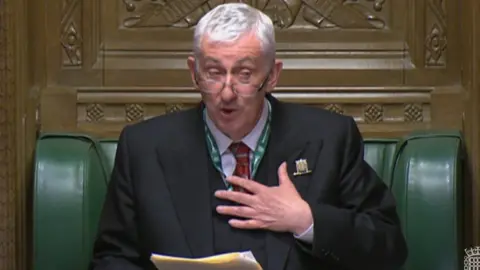How the row over Commons Speaker Sir Lindsay Hoyle unfolded
 UK Parliament/PA Media
UK Parliament/PA MediaCommons Speaker Sir Lindsay Hoyle should not continue in his role, the SNP has said.
The party's Westminster leader, Stephen Flynn, was speaking in the Commons after an evening of chaos in the chamber, following an impassioned debate on the Israel-Gaza war.
Sir Lindsay had decided to allow a vote on a Labour amendment to an SNP motion, calling for an immediate ceasefire in the conflict, sparking fury among SNP and Conservative MPs who accused him of breaking with parliamentary convention.
On Thursday, Mr Flynn said proceedings had "descended into farce".
Sir Lindsay responded by offering the SNP an emergency debate on the conflict in Gaza and apologised for a second time, saying "I made a mistake".
He said his priority was MPs' safety, adding: "I have a duty of care and if my mistake is looking after members, I am guilty."
We look back at how the row unfolded.
15 November 2023
- Sir Keir Starmer suffers a major rebellion over his stance on the Israel-Gaza war, with 56 Labour MPs backing an SNP motion calling for an immediate ceasefire. Ten Labour frontbenchers leave their jobs
21 February 2024
- The SNP, the third largest party in the Commons, has an Opposition Day debate and uses it to put forward another motion calling for an immediate ceasefire in Gaza
- As the debate approaches, pro-Palestinian demonstrators gather outside in Parliament Square
- Labour MPs are under increasing pressure from many constituents to support an immediate ceasefire and Sir Keir faces the prospect of another rebellion
- Labour has shifted its position on the war, now calling for an "immediate humanitarian ceasefire"- and puts forward an amendment to the SNP motion
- The government also puts forward its own amendment
- By parliamentary convention, an opposition party amendment (in this case Labour's) to a motion submitted by another opposition party (the SNP) is not put to a vote when there is also a government amendment
- But among representations made to the Commons Speaker, Sir Keir meets Sir Lindsay
- The Speaker decides the Commons will vote first on Labour's amendment before moving on to further votes on the SNP's original motion and then the government proposal for an "immediate humanitarian pause"
- The Speaker's decision provokes fury on the Conservative and SNP benches. They accuse him of helping Sir Keir avoid another revolt
- As the first vote approaches, Commons Leader Penny Mordaunt says the speaker has "undermined the confidence" of the House in him - and announces the Conservatives will take no further part in proceedings
- Conservative MPs walk out in protest and SNP MPs also leave the chamber. The Labour motion is carried without a formal vote
- After various points of order, calls for the Speaker to return to the chamber to explain himself , and shouts of "resign", an emotional Sir Lindsay apologises to MPs and promises to hold talks with senior party figures
- He says: "I thought I was doing the right thing and the best thing, and I regret it, and I apologise for how it's ended up"
- He says he took the decision to allow all sides to express their views because he was "very, very concerned about the security" of MPs who have received personal threats
- Mr Flynn says he will take significant convincing that the Speaker's position is "not now intolerable", arguing his party has been treated with "complete and utter contempt"
22 February 2024
- Labour denies claims that it warned Sir Lindsay he would lose the party's support for him continuing as Speaker after a general election, if he did not allow a vote on its amendment
- Senior Labour MP Pat McFadden accuses the Conservatives of causing the chaos in the chamber by walking away from the debate, because they did not have the numbers to pass their amendment
- Health Minister Maria Caulfield says she would "struggle to support" the Speaker, adding his position is now "difficult"
- In the Commons, Ms Mordaunt blames Labour for last night's "shameful events", calls Sir Lindsay a "decent man" and accuses Labour of damaging the office of Speaker
- The Speaker faces a series of meetings with Conservative, Labour and SNP figures, in an attempt to clear the air
- But Mr Flynn pre-empts that by calling for a confidence vote in Sir Lindsay, saying the Speaker had ignored Commons officials' advice and denied his party a vote
- In response, Sir Lindsay issues a further apology, while emphasising his concerns about MPs' security, saying: "I never ever want to go through a situation where I pick up a phone to find a friend, of whatever side, has been murdered by terrorists"
- He offers the SNP an emergency debate on the Gaza war, adding: "I apologise to the SNP... and I apologise to the House. I made a mistake. We do make mistakes. I own up to mine"
- Away from the Commons, Sir Keir "categorically" denies threatening the Speaker in any way, saying he urged him to ensure "the broadest possible debate" with a number of options
- Downing Street declines to say whether the prime minister retains confidence in Sir Lindsay, saying this is a matter "for the House"
- Meanwhile, 70 Tory and SNP MPs plus one independent have signed a Commons motion declaring they have no confidence in him